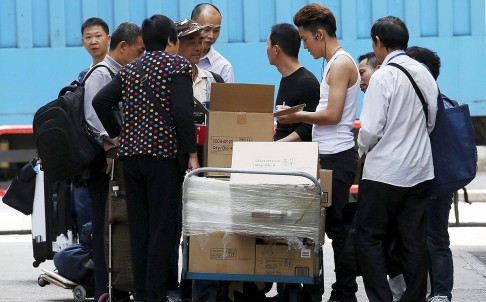Parallel trading syndicates issue smugglers with ‘receipts’ to evade arrest
Traders pose as genuine buyers with papers supplied by syndicate bosses
PUBLISHED : Wednesday, 15 April, 2015, 11:12pm
UPDATED : Thursday, 16 April, 2015, 1:19am
Clifford Lo [email protected]

An order in Sheung Shui bound for Shenzhen. Photo: Reuters
Syndicates behind rampant cross-border parallel trading have a new tactic to help smugglers evade arrest as the government steps up its crackdown.
Government sources say they now issue their runners or smugglers with official-looking receipts that itemise all goods and prices as "proof" the purchases are above board and made by genuine buyers.
Armed with such receipts, the runners have an easier chance of escaping detection when they ferry the goods from Hong Kong to Shenzhen to be resold at a profit by the syndicates.
"The note is just like a receipt in a purchasing deal and is used to prove they are shoppers instead of so-called parallel-goods traders," a source said.
He said that previously such notes did not include prices. The source admitted "the new tactic makes it difficult to gather evidence against them".
Mainlanders who enter Hong Kong for sightseeing will be arrested for breaching their condition of stay if they engage in parallel trading. Thousands of smugglers from the mainland and Hong Kong are paid to deliver the parallel-import goods into Shenzhen through the Lo Wu checkpoint each day.
They pick up goods at warehouses in industrial buildings near Sheung Shui and Fanling MTR stations. Popular items include tins of milk powder, diapers, daily necessities, health care products and small electrical appliances such as toasters. The smugglers evade import taxes charged by mainland authorities.
"Intelligence shows they are paid between HK$100 and HK$200 a trip to deliver parallel-import products [from Hong Kong] to Shenzhen," the source said.
It is understood that they receive the money after handing over the goods to syndicate collaborators outside the mainland side of the Lo Wu checkpoint.
After the mainland authorities announced on Monday that Shenzhen residents with multiple-entry permits would only be allowed to visit Hong Kong once a week, another government source said it was possible more Hongkongers would be recruited into the trade. "We believe more than 2,000 Hongkongers are involved in parallel-goods trading," this source said. "A full-time smuggler can make four to five return trips a day."
He said they included the unemployed, elderly and housewives, and most of them were recruited through referrals. The source believed that several syndicates were in operation, with ringleaders on both sides of the border.
In the first quarter of the year, the Immigration Department refused entry to more than 6,300 mainland visitors it suspected of parallel trading. This was a three-fold increase on the 1,988 in the same period last year. During the same period, officers from Hong Kong and Shenzhen customs cracked 17 smuggling cases involving parallel traders and smugglers, seizing goods with a total value of HK$1.2 million.
